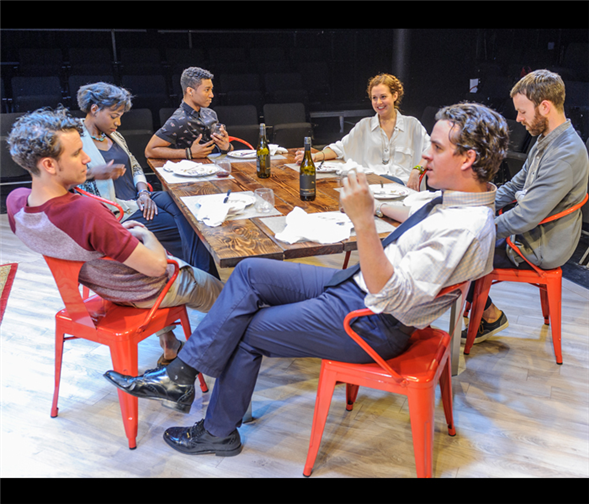Keeping an ear to the ground to listen for societal shifts is an essential part of the theatremaking process for director-playwright Michael Perlman, whose Off-Broadway play
At the Table, now at HERE Arts Center in a production from Fault Line Theatre, takes the pulse of a group of culturally eclectic friends in their thirties.
Just as his 2012 drama,
From White Plains, emerged at a time when gay bullying was in the media spotlight, his new play picks up on a national discussion. The idea emerged from a conversation between Perlman and Fault Line's co-artistic directors, Craig Wesley Divino and Aaron Rossini, who had produced the earlier show. "Aaron and Craig and I were talking about the way sexuality is talked about in America [and] how people who think they're liberal adjust to things that society tells them they're not supposed to adjust to," Perlman explains. "As we were talking about that, we were talking a lot about the way America is changing."
Characters who were Perlman's contemporaries — people whose college years were more than a decade behind them — began to materialize in the playwright's imagination. The play opens with an intimate weekend gathering of eight urban friends in a lakehouse. An opinionated white man expresses himself about abortion, an African-American man challenges a black woman about her identity, and a gay man struggles with loneliness and possible addiction. "The country is moving away from the straight white man at the center of everything, and the country is kind of freaking out," Perlman says. "The country is at an age similar to what being in your thirties feels like: at some point we're going to have to decide who we are."
{Image1}
He adds, "What happens in this microcosm of friends when the straight white man is moving out of the center of conversation? We don't quite know how to go through this transition. The way we talk about race, transgender people, sexuality – it still feels like there are two different Americas. [The play is] very much about the politics of America, but at some point we had to let that go and just write these characters."
And Perlman didn't just write the characters, he aggressively
rewrote them in three workshops over 18 months. In fact, not long before the first preview at HERE's 99-seat mainstage, he even scrapped his second act, modifying the setting and reassigning key relationships.
A collegial shorthand among the artistic personnel aided in implementing such extreme changes. The trust between the playwright, Divino, and Rossini (who also appear in
At the Table) is rooted in the trio's time together in Brown University's graduate theatre program, where all three earned master's degrees. Indeed, the entire cast is made up of fellow Brown University theatre alumni.
"I very much believe in transparency," Perlman says. "The day that I brought in the brand new Act Two, I said to them, 'I'm tired and this was hard to write, so I need you to tell me that it's good before you tell me anything that's wrong with it. We can definitely talk about what's wrong with it, but you absolutely need to tell me what I did right first, so I'm able to hear you.' We're able to ask for what we need. That comes because we really trust each other."
The plays of Chekhov – often set in country houses where the passage of time and the comings and goings are fraught with meaning – were on Perlman's mind during the creation of this show. After all, his master's thesis project at Brown was directing
Uncle Vanya. "I think I was a little scared, quite honestly, because the country house is such the iconic setting," he says, adding that much like in Chekhov,
At the Table is "not about the plot, it's about the conversation. Part of what the play's about is that as much as things change, things don't change. And you have to acknowledge both in order to figure out your place in the world."
During rehearsals, Perlman took the cast on a retreat to his parents' country house in the Berkshires, a setting that closely resembles the world of the script. When they arrived, they found a dead bird – though not a seagull – outside a window. "It was too perfect," Perlman says with a laugh.
---
Kenneth Jones is a dramatist and a theatre journalist. He also writes at ByKennethJones.com.Photos by Jacob J. Goldberg. Top photo: The cast of At the Table